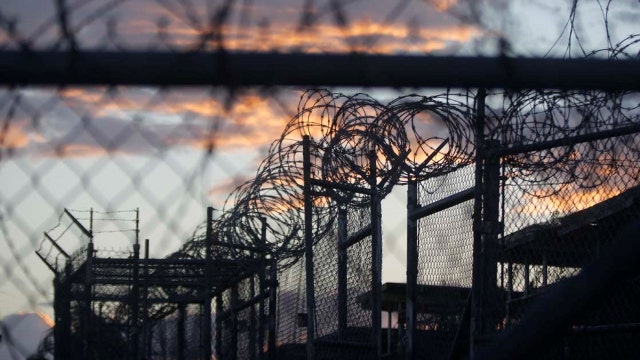What's next for Guantanamo Bay?
Defcon 3: Former Defense Department spokesman J.D. Gordon discusses what may happen if inmates are transferred out of the prison and into the US
WASHINGTON – The first of 17 detainees scheduled to be released from the Guantanamo Bay prison in January will be transferred next week, as the Obama administration continues to reduce the population at the controversial detention center, a senior U.S. official said Monday.
Another three detainees are slated to appear before a review board during January to determine if they can also be considered eligible for transfer to another country, the official added.
Defense Secretary Ash Carter notified Congress earlier this month that 17 detainees would be transferred to other countries in January. Those transfers will begin with several moving out next week. The 17 are more transfers than Carter has approved all year, and they will reduce the total detainees at Guantanamo to 90, with 31 still eligible for transfer.
In the 10 months since Carter took office in February, he transferred 15 detainees out of Guantanamo.
The official was not authorized to discuss the transfers publicly and spoke on condition of anonymity.
The White House has been struggling to close the Guantanamo Bay detention center, but efforts stalled in recent months amid staunch opposition in Congress to any plan to move detainees to a U.S.-based prison site. The $607 billion defense policy bill passed by Congress in November includes a provision that bans any movement to the United States.
President Barack Obama opposed the provision, but signed the bill. He promised during his election campaign that he would close Guantanamo, but has been stymied by Congress' opposition to relocating detainees to the U.S., and by the slow process of transferring prisoners to other countries.
Of the 90 detainees who have not yet been cleared for transfer, 59 are currently not eligible for release to another country. The official said that three of those will go before a review board of senior defense, homeland security, military, intelligence, and other officials in January, to reassess whether they can be approved for transfer.
Under the guidelines, transfers cannot be approved unless officials believe the detainees will not return to terrorism or the battlefield upon release, and there must be a host country willing to take them.
Both Carter and his predecessor, Chuck Hagel, came under fire for not moving fast enough to transfer detainees. Pentagon officials have argued that it is often difficult to find a host country that will take a detainee and provide the security guarantees needed.
The Pentagon and White House also insist that a number of the detainees are too dangerous to be released, so the administration is continuing to pursue plans to find an alternate U.S.-based facility. The Pentagon has been refining cost estimates for several sites.













































